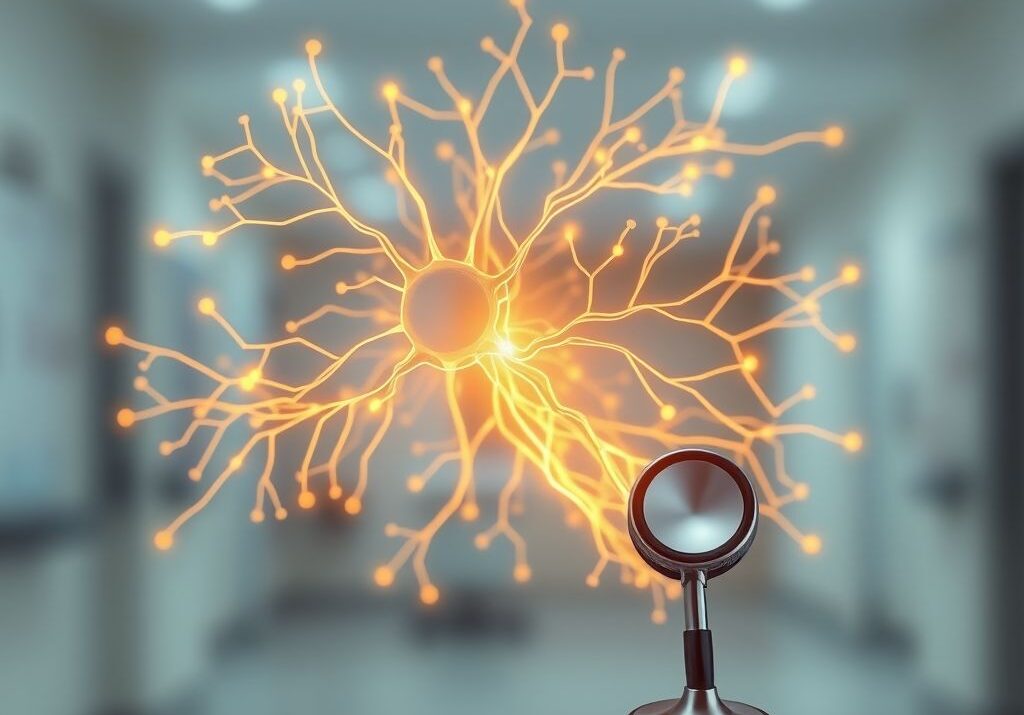Ever wondered if you could just skip the doctor’s appointment and get a diagnosis from a chatbot? Sounds futuristic, right? Well, hold on to your stethoscopes! I stumbled upon a fascinating study out of Oxford that throws a wrench in that “AI doctor” dream, and it’s got me thinking.
The study, highlighted in a recent VentureBeat article, suggests that relying solely on chatbots to assess medical conditions might actually lead to worse patient outcomes compared to, you know, talking to an actual human doctor. Yikes! It seems like we’re missing a crucial ingredient in the recipe for AI healthcare: the human element.
Think about it. A chatbot relies on algorithms and data. It can spit out information based on keywords and symptoms you enter. But can it truly understand the nuances of your individual situation? Can it pick up on the subtle cues in your voice, your body language, or the unspoken worries behind your words? Probably not.
As the Journal of Medical Internet Research (JMIR) highlighted in a 2023 study, the current challenge with chatbots in healthcare centers around limitations in complex reasoning and personalized care. This reinforces the idea that while chatbots can augment healthcare, they aren’t ready to replace human interaction, especially in diagnostics.
According to a study published by JAMA Network Open in 2024, when chatbots were tested against physicians in a standardized diagnostic scenario, the human doctors demonstrated higher accuracy in complex and rare cases. This underscores the critical need for human oversight when leveraging AI tools in medical assessments.
This isn’t about bashing chatbots. They definitely have a place in healthcare! Think automated appointment reminders, answering frequently asked questions, or even providing initial information about common ailments. They can free up doctors’ time and make healthcare more accessible. But the key is to understand their limitations and use them wisely.
Here are my 5 takeaways from this whole thing:
- AI is a tool, not a replacement: Chatbots are helpful assistants, but they aren’t equipped to replace the critical thinking and empathy of a human doctor.
- Context is king: Human doctors can gather a wealth of information beyond symptoms – family history, lifestyle, environmental factors – that a chatbot might miss.
- Personalized care matters: Healthcare isn’t one-size-fits-all. Human interaction allows for tailoring treatment plans to individual needs and preferences.
- Trust is essential: Patients need to feel heard and understood. Building trust is easier with a human doctor who can offer reassurance and support.
- Testing needs a human touch: We need to include real patients in the testing and development of these AI systems to accurately measure real-world outcomes.
So, where do we go from here? It’s clear that integrating the human element into chatbot testing and development is crucial. We need to focus on creating AI tools that support doctors, not replace them. Maybe that means incorporating more natural language processing to better understand emotional cues or developing AI that can flag potential biases in its own diagnoses.
The future of healthcare will likely involve a combination of human expertise and AI assistance. But let’s not forget that the human connection is at the heart of good medical care. Just add humans!
FAQs About Chatbots in Healthcare:
1. Are chatbots safe to use for medical advice?
Chatbots can be helpful for basic information, but they should not be used as a replacement for professional medical advice. Always consult with a qualified healthcare provider for any health concerns.
2. What are the benefits of using chatbots in healthcare?
Chatbots can improve access to care, provide quick answers to common questions, and help with appointment scheduling and reminders.
3. What are the risks of using chatbots for medical diagnosis?
The risks include inaccurate diagnoses, missed critical symptoms, and a lack of personalized care.
4. Can chatbots replace doctors in the future?
While chatbots can assist doctors, it is unlikely they will completely replace them due to the need for human empathy, complex decision-making, and personalized care.
5. How accurate are medical chatbots?
Accuracy varies depending on the complexity of the medical issue and the chatbot’s programming. Studies have shown that human doctors are more accurate in complex and rare cases.
6. What kind of information should I not share with a medical chatbot?
Avoid sharing highly sensitive personal information, such as financial details or social security numbers.
7. Are my conversations with medical chatbots private?
Privacy policies vary. Review the chatbot’s privacy policy to understand how your data is stored and used.
8. What regulations govern the use of chatbots in healthcare?
Regulations are still being developed, but it’s important that they comply with data privacy laws and guidelines to ensure patient safety and confidentiality.
9. How can I ensure the chatbot I’m using is reliable?
Look for chatbots that are developed by reputable healthcare organizations or have been vetted by medical professionals.
10. What should I do if I disagree with the advice given by a medical chatbot?
Always seek a second opinion from a qualified healthcare provider. Chatbots should not be the sole source of your medical information.







